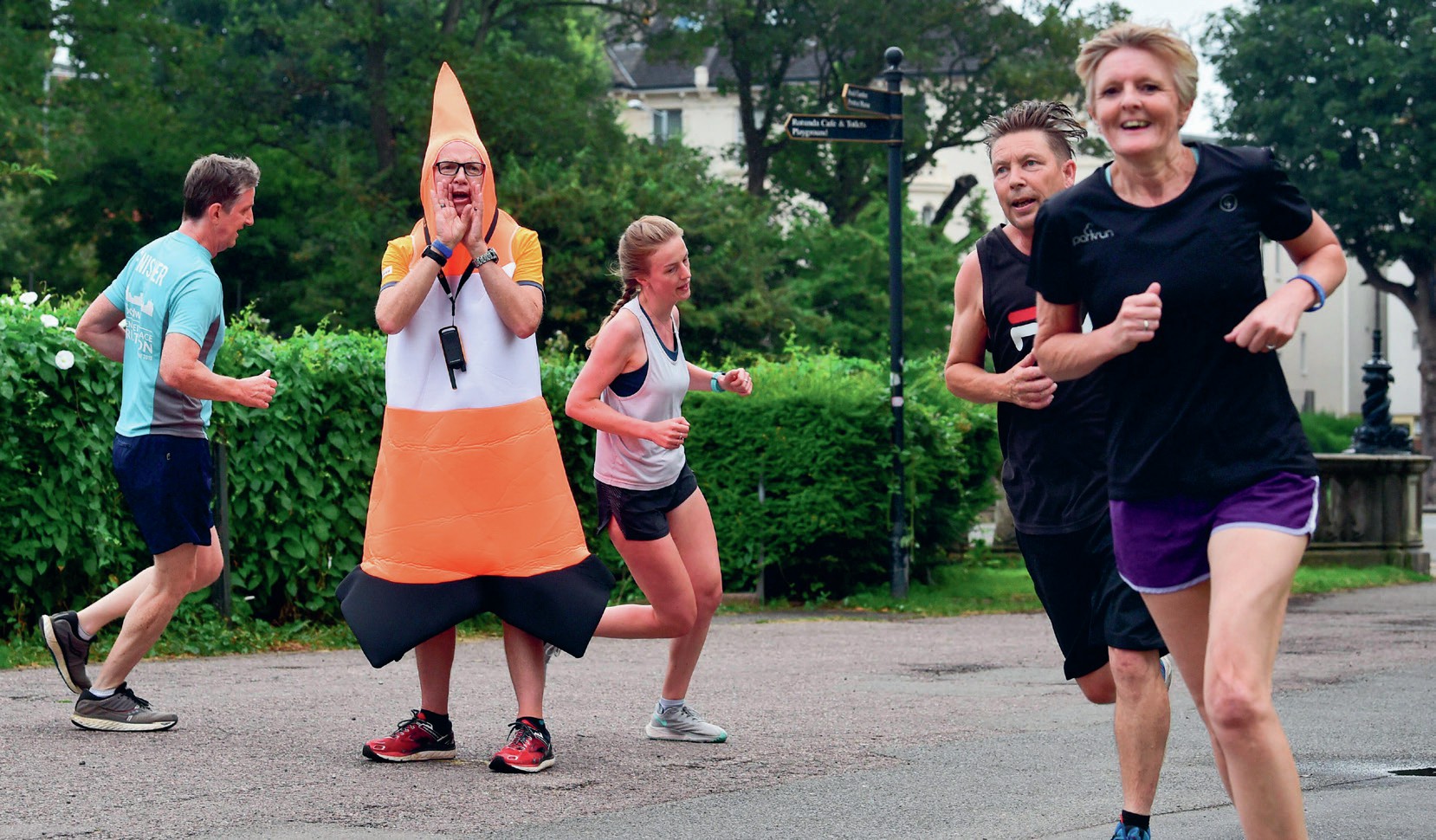Is physical activity the key to our wellbeing?

SPEC CHECK
■ exercise and mental health
■ depression
■ anxiety
■ cognition
You may have heard the old saying that having a healthy body leads to a healthy mind. But is this actually true?
‘Physical activity’ is defined as any bodily movement produced by skeletal muscles that requires energy expenditure. This includes ‘exercise’, which is physical activity with the purpose of improving or maintaining health and fitness. When talking about physical activity, we can mean things like walking and running, playing sports and games, as well as dancing, lifting weights and any activity that gets us moving.
How much physical activity is good?
The World Health Organization recommends that young people aged 5–17 should be averaging at least 60 minutes per day of moderate-to-vigorous intensity physical activity (MVPA) across the week. This should include activities that strengthen muscle and bone on at least 3 days a week. This does not have to be really intense activity, or one 60-minute block a day, but can be broken down into shorter periods. For example, the target could be reached via a 15-minute brisk walk to school in the morning, 20 minutes of activity during the school day, a 15-minute walk home and then some activity in the evening (for example, sport/dancing etc.).
However, many people across the world are not doing anywhere near the recommended amount of physical activity. For example, Regina Guthold and colleagues (2020) reported that, in 2016, 81% of young people aged 11–17 were not doing sufficient amounts of physical activity. In the UK, 75% of boys and 85% of girls did not do enough physical activity.
But you may be asking, why does it matter? We know that taking part in regular physical activity has many benefits for our physical health. It helps us keep a healthy weight, reduces the risk of many diseases (for example, heart disease and some types of cancer) and can help us to live a longer and healthier life. But it is also beneficial for our psychological health.
Physical activity and psychological outcomes
There is good evidence that physical activity is beneficial for mental health across the lifespan, and this includes children and young people. Research studies often differ depending on whether they look at the immediate impact of activity (i.e. an acute activity) or look at general levels of physical activity (i.e. chronic activity), or whether they explore intervention programmes specifically designed to increase physical activity levels. There is evidence from each of these types of studies which shows that physical activity is beneficial for mental health.
It is also important to consider whether evidence only shows that physical activity is related to/associated with mental health, or whether there is actual evidence of causality, i.e. that physical activity causes mental health to improve. A recent review of 42 other reviews (Biddle et al. 2019) has looked at this:
■ Depression: interventions were found to be generally beneficial in children and young people. Such interventions benefited those who experienced depression as well as nondepressed samples.
■ Anxiety and self-esteem: there were fewer studies published and the findings were more mixed. However, the general pattern was that physical activity could reduce anxiety and improve self-esteem in young people.
The review by Biddle et al. also looked at the impact of physical activity on cognition (for example, memory and attention) as well as academic attainment (i.e. exam performance), and also looked at brain function and structure. There was evidence for a beneficial impact of physical activity, and indeed fitness, on all of these aspects of cognition. The effects were larger for cognition than they were for academic attainment, although we know from other research evidence that cognitive skills are important for school attainment. Of particular interest though, was support for a causal relationship. That is, physical activity can cause improvements in cognition in young people.
Explaining physical activity benefits
Several factors have been proposed to explain why physical activity might cause improvements in mental health and cognition. Another review (Lubans et al. 2016) investigated neurobiological factors (for example, grey matter volume in the brain), psychosocial factors (for example, mood and connectedness) and behavioural factors (for example, sleep). While the review found some support for the importance of these underlying factors, the researchers also cautioned that additional high-quality evidence was needed. Their proposed model of neurobiological, psychosocial and behavioural factors highlights some of the reasons why physical activity might lead to improvements in mental health and cognition, but demonstrates that we don’t fully understand these relationships yet.


One further factor which it is important to consider is the relationship between cognition and mental health. This is an example of a bidirectional relationship, where cognition is important for mental health, but mental health is important for cognition. For example, we have all experienced stress, and you probably can appreciate how feeling stressed (poor mental health) can make it more difficult to focus our attention on an important task (cognition).
When it comes to physical activity, therefore, it is difficult to tease out the exact nature of this relationship. Physical activity can make you feel healthier and happier, and when we feel happier, it is easier to focus in class or motivate yourself to study. Likewise, physical activity supports the areas of the brain which are important for focusing attention. We need to be able to focus attention on problem solving and overcoming hurdles when life is challenging in order to be able to be resilient, for example. It is therefore important to remember that our mental health and cognition are intricately linked to our physical health too.
The evidence base shows that all types of movement can be beneficial, even a 10-minute walk can help
What can we do?
The fact that there is evidence that physical activity causes improvements in cognition and mental health is really important for us all to know about. This knowledge can positively impact on school pupils, parents and teachers, and lead to changes in the school environment. It means that taking time out of your studies to go for a walk, for example, can help refocus your attention and boost your memory, which can then lead to improvements in school attainment itself.
Physical activity is also beneficial for mental health itself though, which gives an extra incentive to break up the day with movement of some form. It also lends support for including time for physical activity and PE in the school curriculum, and making sure we take time to exercise even when we feel stressed by exam revision. In fact, this is potentially when you will feel the benefit even more.
The evidence base shows that all types of movement can be beneficial, even a 10-minute walk can help. Activities that are social in nature, that we do outdoors, and in green space, and that include a cognitive load, such as rules of a sport, could be the most impactful though.
It is also crucial to do activity that you enjoy — activities that make us happy can be the best. Dancing, playing frisbee on the beach, any activity that is right for you — not everyone likes to play team sports, or go for a run, but any activity is generally better than none. The key is to find something that works for you as an individual and try to build movement into every day. As well as keeping your body healthy, it can keep your mind healthy too.
PsychologyReviewExtras
Go to www.hoddereducation.co.uk/psychologyreviewextras for a quiz to check your understanding of this article.
RESOURCES
Biddle, S. J. H., Ciaccioni, S., Thomas, G. and Vergeer, I. (2019) ‘Physical activity and mental health in children and adolescents: an updated review of reviews and an analysis of causality’, Psychology of Sport and Exercise, No. 42, pp. 146–55.
Guthold, R., Stevens, G. A., Riley, L. M. and Bull, F. C. (2020) ‘Global trends in insufficient physical activity among adolescents: a pooled analysis of 298 population-based surveys with 1.6 million participants’, The Lancet Child & Adolescent Health, Vol. 4, No. 1, pp. 23–35. Available at: www.tinyurl.com/37fskhvw.
Lubans, D., Richards, J., Hillman, C. et al. (2016) ‘Physical activity for cognitive and mental health in youth: a systematic review of mechanisms’, Pediatrics, Vol. 138, No. 3, e20161642.





